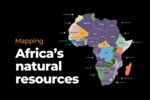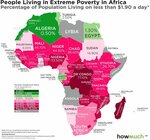

In the field of earth sciences, a discussion has been raging for years around the subject of the ‘resource curse.’ ‘Resource curse’ is the phenomenon of countries with an abundance of natural resources but with little democratic stability and low development outcomes in comparison with countries with much fewer natural resources. Take, for example, Africa; it is home to some 30 percent of the world’s mineral reserves, eight percent of the world’s natural gas, and 12 percent of the world’s oil reserves. The continent has 40 percent of the world’s gold and up to 90 percent of its chromium and platinum. The largest reserves of cobalt, coltan, diamonds, platinum, and uranium in the world are in Africa. Considering such great mineral wealth why is it that this is not reflected in the development indices of the 55 countries on the African continent? Is this a case of ‘resource-rich and ‘resource curse’?
The United Nations’ Sustainable Development Goals and the African Union’s Agenda 2063 reports clearly show that in Africa, the number of on-track targets is less than the number of targets that require acceleration. Of course, in comparing countries in the North and in the South, such as Africa, there has not been a level playing field due to imperialism and colonial legacies.
What is of great interest is that this debate cannot be isolated to the purview of geologists and economists as it raises theological issues. Christians hold the view that God gave governments for the administration of good governance, and where there is injustice, it should be frowned upon and opposed, such as the ill-treatment of the poor, the immigrant, and even the enslaved. So what implications are there for Christian denominations that have international missions in ‘resource-rich’ nations such as the Democratic Republic of the Congo (DRC)? Do we, for example, teach and train our elders, deacons, women leaders, and youth leaders to lobby their respective governments for the nation’s resources to be seen as a shared inheritance, to be held in trust for future generations? Thereby proposing that the royalties gained from the nation’s resources should essentially be seen as compensation for the sale of the shared inheritance.
Another aspect of the so-called ‘resource curse’ is the conflicts that arise where there are large deposits of minerals such as ‘blood diamonds. There are over 120 militias fighting for control of North Kivu and South Kivu provinces in the Eastern part of the Democratic Republic of the Congo (DRC). Why? Because whoever controls these provinces has access to the vast mineral wealth of the region. It was estimated that last year, 12 tons of gold worth roughly US$500 million was smuggled out of the DRC. These high financial revenues have been identified as the primary incentives for the conflict in the DRC.
Christian denominations, institutions and agencies that operate in ‘resource rich’ nations have a critical role to play in offering charitable service to the poor, sick and vulnerable. However, the role of the church requires us to also enter dialogue with our brothers and sisters on how together we interpret biblical texts such as ‘righteousness exalts a nation’ and ‘if the foundations be destroyed what shall the righteous do?’ Through this ‘contextualisation’ of the biblical text we can be a part of turning curses into blessings.
Comments
No comments on this item Please log in to comment by clicking here